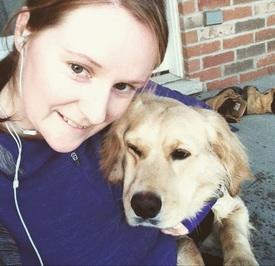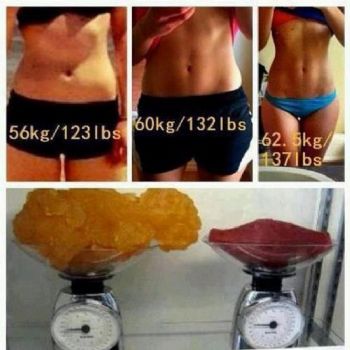"muscle vs. Fat"

GlindaGoodwitch
Posts: 157 Member
Yes. Muscle weighs more than fat. I lost 10 pounds (yay!) then started exercising - no change in diet - and am now starting to see weight GAIN. I know muscle weighs more, but at what point will I start to see weight LOSS again, while remaining active. I'm running 3-5 times per week, doing interval training.
* Edit: Thank you for the clarification (a pound is a pound etc).
* Edit: Thank you for the clarification (a pound is a pound etc).
0
Replies
-
Yes, but muscle is also pretty slow to build. What you're seeing might be a little bit of muscle gain, but also a good deal of water retention that comes with increased exercise. Either way, I would reassess your routine if you don't start seeing the results you want after 3-4 weeks of consistency.0
-
No. Muscle does not weigh more than fat. 1lb of muscle weighs the same as 1lb of fat. Muscle is, however, more dense than fat and takes up less space.0
-
diannethegeek wrote: »Yes, but muscle is also pretty slow to build. What you're seeing might be a little bit of muscle gain, but also a good deal of water retention that comes with increased exercise. Either way, I would reassess your routine if you don't start seeing the results you want after 3-4 weeks of consistency.
^^ This
If you haven't changed your diet (ie - you're still eating in a deficit) it's absolutely assuredly not muscle gain, especially with very little meaningful weight lifting.
0 -
No, it doesn't, its just SMALLER in size so there will be less of you. Any gain is water retention from increased exercise.
The water retention will go in a few days but you have to be prepared for fluctuations in weight all the time, everyone is different but for most its +/-3 to 5 lbs.0 -
notnikkisixx wrote: »No. Muscle does not weigh more than fat. 1lb of muscle weighs the same as 1lb of fat. Muscle is, however, more dense than fat and takes up less space.
No. Muscle does not take up less space than fat. 1 cubic inch of muscle takes up the same amount of space as 1 cubic inch of fat. Muscle is, however, more dense than fat and weighs more.0 -
diannethegeek wrote: »notnikkisixx wrote: »No. Muscle does not weigh more than fat. 1lb of muscle weighs the same as 1lb of fat. Muscle is, however, more dense than fat and takes up less space.
No. Muscle does not take up less space than fat. 1 cubic inch of muscle takes up the same amount of space as 1 cubic inch of fat. Muscle is, however, more dense than fat and weighs more.
TOUCHE!
0 -
GlindaGoodwitch wrote: »Yes. Muscle weighs more than fat. I lost 10 pounds (yay!) then started exercising - no change in diet - and am now starting to see weight GAIN. I know muscle weighs more, but at what point will I start to see weight LOSS again, while remaining active. I'm running 3-5 times per week, doing interval training.
Dianne nailed it. It's mostly water weight and should subside in a few weeks.0 -
Muscle does NOT weigh more than FAT.
Muscle is denser and takes up less space. One pound of feathers weighs the same as 1 pound of flour....0 -
Muscle does NOT weigh more than FAT.
Muscle is denser and takes up less space. One pound of feathers weighs the same as 1 pound of flour....
Muscle does NOT take up less space than FAT.
Muscle is denser and weighs more. One cubic inch of feathers takes up the same amount of space as 1 cubic inch of flour....
0 -
Good point - that is such a ridiculous statement. A pound is a pound.
And thank you for the water retention explanation - that does make more sense! I've been extremely diligent on what goes into my body, so the added exercise is only a positive for sure, but I'm excited to see the results!
Thanks guys and gals!0 -
Ugh.0
-
Muscle is more dense than fat. a pound of fat weighs the same as a pound of muscle
 0
0 -
diannethegeek wrote: »notnikkisixx wrote: »No. Muscle does not weigh more than fat. 1lb of muscle weighs the same as 1lb of fat. Muscle is, however, more dense than fat and takes up less space.
No. Muscle does not take up less space than fat. 1 cubic inch of muscle takes up the same amount of space as 1 cubic inch of fat. Muscle is, however, more dense than fat and weighs more.
Sigh. No it DOESN'T! I think this is my absolute pet hate when people talk about muscle weighing more than fat, or from my female colleagues, that if they ve gained 10lbs in a month that it "must be muscle". Grrrrrrrrrrrr.
Unless you live in an alternate reality, 1lb of anything will weigh EXACTLY the same as 1lb of something else - ie 1lb of muscle weighs exactly the same as 1lb of fat as 1lb of feathers as 1lb of coal - the hint is in the fact that they are all 1lb! The volume of those things may be different but it will still be 1lb in weight.
You also directly contradict yourself in your post.... I don't understand how you can insist that 1 cubic inch of muscle and 1 cubic inch of fat are the same, and yet say that 1lb of muscle and 1lb of fat do not weigh the same!
We have muscle and fat as "blocks" for teaching aids and i can assure you that the muscle takes up a lot less space than the fat.0 -
Sapphire_Elf wrote: »diannethegeek wrote: »notnikkisixx wrote: »No. Muscle does not weigh more than fat. 1lb of muscle weighs the same as 1lb of fat. Muscle is, however, more dense than fat and takes up less space.
No. Muscle does not take up less space than fat. 1 cubic inch of muscle takes up the same amount of space as 1 cubic inch of fat. Muscle is, however, more dense than fat and weighs more.
Sigh. No it DOESN'T! I think this is my absolute pet hate when people talk about muscle weighing more than fat, or from my female colleagues, that if they ve gained 10lbs in a month that it "must be muscle". Grrrrrrrrrrrr.
Unless you live in an alternate reality, 1lb of anything will weigh EXACTLY the same as 1lb of something else - ie 1lb of muscle weighs exactly the same as 1lb of fat as 1lb of feathers as 1lb of coal - the hint is in the fact that they are all 1lb! The volume of those things may be different but it will still be 1lb in weight.
You also directly contradict yourself in your post.... I don't understand how you can insist that 1 cubic inch of muscle and 1 cubic inch of fat are the same, and yet say that 1lb of muscle and 1lb of fat do not weigh the same!
We have muscle and fat as "blocks" for teaching aids and i can assure you that the muscle takes up a lot less space than the fat.
She's using the inverse of the "a pound is a pound" argument and is correct.
Yes, a pound is a pound.
Yes, a cubic inch is a cubic inch.
A pound of muscle takes up less space than a pound of fat.
A cubic inch of muscle weighs more than a cubic inch of fat.0 -
The problem with the muscle takes up less space/weighs more argument is that you're both right, and wrong at the same time because density is a measurement of both space, and mass, so you can't just say space does one thing while the weight remains unaffected, and vice versa.
The way to say it is that five pounds of muscle weighs the same as five pounds of fat, but the space that five pounds of muscle takes up is less than the space five pounds of fat takes up. Conversely, one cubic foot of fat takes up the same space as one cubic foot of muscle, but one cubic foot of muscle weighs more than one cubic foot of fat.
End of argument.0 -
It's water retention.
When I increase my water intake my weight always goes down, obviously eating well and exercising.
When I'm dehydrated I always retain water weight.
TOM, sodium, too many carbs, dehydration, and muscle building are all reasons for water retention.
Can be fustrating!!
Just stick with your routine and diet, increase water intake!0 -
Diannethegeek is my hero right now.0
-
peachyfuzzle wrote: »The problem with the muscle takes up less space/weighs more argument is that you're both right, and wrong at the same time because density is a measurement of both space, and mass, so you can't just say space does one thing while the weight remains unaffected, and vice versa.
The way to say it is that five pounds of muscle weighs the same as five pounds of fat, but the space that five pounds of muscle takes up is less than the space five pounds of fat takes up. Conversely, one cubic foot of fat takes up the same space as one cubic foot of muscle, but one cubic foot of muscle weighs more than one cubic foot of fat.
End of argument.
*applause*
0 -
OP - are you lifting progressively heavier things? How many calories a day are you eating?
-
NO offense, but I don't think you are building muscle with interval training and three to five days a week of cardio....0 -
I’ll avoid the measurement argument (although density is the answer).
I will say this: Weight loss is a terrible goal. What I believe you want is fat loss. When people fixate on the scale, they’re pushed to make some very unhealthy choices. Instead of the scale, you should focus on the following:
- How do I feel?
- How and I sleeping?
- How is my energy level?
- Am I losing body fat (this can be by direct measurement or through a proxy of body measurements - neck, chest, stomach, waist, hips, upper arms, upper legs).
- Am I meeting my other health goals (strength, muscle mass gain/retention, endurance, cardiovascular, mobility, balance, agility, speed, etc.)?
- How does my blood work look (for some, this last one is optional, but I like to know and tweak my program to suit)?
0 -
yeah, for true Dianne, your explanation is getting a bit confused.
I agree that 10lbs of muscle weighs the same as 10lbs of fat. Truth.
Also agree that 1 cubic sq inch of muscle takes up the same amount of space as 1 cubic sq inch of fat. Truth.
But...because muscle is denser than fat, muscle will take up less space than fat, given that they are the same weight. If instead of being the same weight, they are the same volume, then then muscle will be heavier than the fat. But, you cant have fat and muscle be both the same weight *and* occupy the same amount of space. They simply are not equal.
Same goes for bricks and feathers...they cannot be both the same weight and volume at the same time..its one or the other due to the composition of whats being measured.
All that being said...from what I understand...also agree that the gains are likely water retention and something about muscle repair and stuff. (very scientific, I know...LoL! While I did retain some of what I learned in high school chemistry and sure about how to measure things, Im still learning the ins and outs of fitness)
0 -
diannethegeek wrote: »Muscle does NOT weigh more than FAT.
Muscle is denser and takes up less space. One pound of feathers weighs the same as 1 pound of flour....
Muscle does NOT take up less space than FAT.
Muscle is denser and weighs more. One cubic inch of feathers takes up the same amount of space as 1 cubic inch of flour....
I nominate Diannethegeek as the winner of this thread
0 -
Bottom line...a pound of muscle on my *kitten* looks a lot better than a pound of fat on my *kitten*.0
-
So, we have identical twins standing next to each other. Each is 5'6" tall, and one weighs 123lbs and has 38% body fat. The other weighs 137lbs and has 18% body fat....which one is going to look "lighter"... Oh wait, here is a picture of that, just with the same woman at different weights/bodyfat levels.

0 -
I'm drinking about 84 ounces of water a day - maybe a bit more - I could increase that, but probably realistically not by much more. How much water do you recommend drinking?0
-
When comparing density, you weigh equal VOLUMES and compare. When volume is EQUAL, muscle weighs more than fat. There is NO DISPUTE in the scientific community on this. The dispute lies with people who always compare a pound with a pound, a liter with a liter, etc.
Next argument will be that "natural" sugar is different than "processed" sugar when digested.
A.C.E. Certified Personal and Group Fitness Trainer
IDEA Fitness member
Kickboxing Certified Instructor
Been in fitness for 30 years and have studied kinesiology and nutrition
0 -
For the record... I did not intentionally open this can of worms LOL0
-
This content has been removed.
-
-
Not your fault. People just tend to be overly pedantic. Even those saying a pound of muscle weighs the same as a pound of fat knew what you were talking about.GlindaGoodwitch wrote: »For the record... I did not intentionally open this can of worms LOL
0
This discussion has been closed.
Categories
- All Categories
- 1.4M Health, Wellness and Goals
- 397.1K Introduce Yourself
- 44.2K Getting Started
- 260.9K Health and Weight Loss
- 176.3K Food and Nutrition
- 47.6K Recipes
- 232.8K Fitness and Exercise
- 456 Sleep, Mindfulness and Overall Wellness
- 6.5K Goal: Maintaining Weight
- 8.7K Goal: Gaining Weight and Body Building
- 153.4K Motivation and Support
- 8.3K Challenges
- 1.3K Debate Club
- 96.5K Chit-Chat
- 2.6K Fun and Games
- 4.6K MyFitnessPal Information
- 16 News and Announcements
- 18 MyFitnessPal Academy
- 1.4K Feature Suggestions and Ideas
- 3.1K MyFitnessPal Tech Support Questions





















